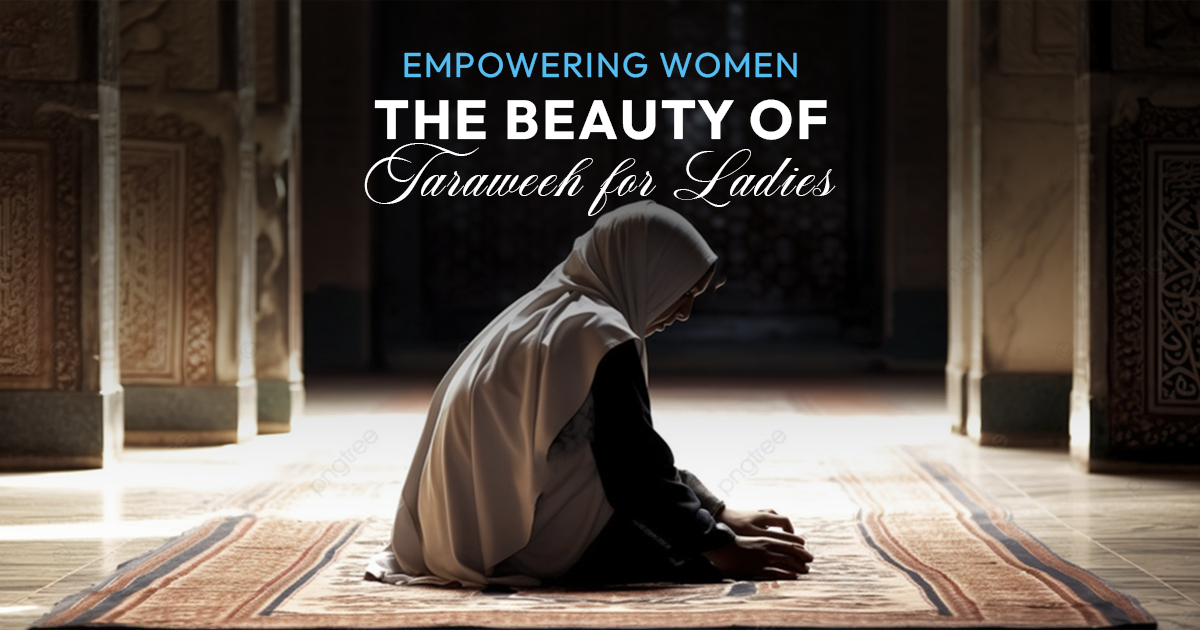Ramadan is a sacred month for Muslims worldwide, marked by fasting, prayer, reflection, and community. One of the significant aspects of Ramadan is the special nightly prayers known as Taraweeh. While traditionally Taraweeh has been seen as a communal activity for men, it’s essential to recognize the beauty and empowerment it offers to women as well. In this guide, we’ll delve into the significance of Taraweeh for women, how they can participate, and the benefits it brings.
Understanding Taraweeh:
Taraweeh prayers are special nightly prayers performed during the month of Ramadan. They consist of lengthy recitations from the Quran, often conducted in congregation at mosques after the obligatory Isha prayer. These prayers hold immense spiritual significance for Muslims, offering an opportunity to deepen their connection with Allah through prolonged worship and reflection.
Empowering Women through Taraweeh:
Traditionally, Taraweeh prayers have been viewed as a predominantly male activity, with men often attending congregational prayers at mosques. However, it’s crucial to recognize that Taraweeh holds equal spiritual value for women, and they can partake in this beautiful act of worship in various ways, both individually and collectively.
Unveiling the Empowering Essence of Taraweeh for Women:
Taraweeh prayers offer a unique avenue for women to assert their spiritual autonomy and engage in meaningful worship.
Inclusivity: Islam emphasizes the inclusion of women in acts of worship. While it’s not obligatory for women to pray Taraweeh in congregation at the mosque, they have the option to do so if they wish. Mosques often offer designated prayer areas or separate halls for women during Taraweeh prayers, ensuring their participation in a comfortable environment.
Spiritual Growth: Engaging in nightly prayers during Ramadan, including Taraweeh, provides women with a unique opportunity for spiritual growth and self-reflection. The serene atmosphere of the mosque, coupled with the recitation of the Quran, fosters a sense of tranquility and closeness to Allah.
Community Bonding: While women have the option to pray Taraweeh individually at home, many choose to attend congregational prayers at the mosque. This not only strengthens their connection with the community but also fosters a sense of sisterhood and solidarity among female worshippers.
Time for Reflection: The extended duration of Taraweeh prayers allows women to immerse themselves in the recitation of the Quran and contemplation of its verses. It serves as a precious time for introspection, seeking forgiveness, and setting spiritual goals for the remainder of Ramadan.
Educational Opportunities: Attending Taraweeh prayers at the mosque provides women with valuable educational opportunities. They can learn from the Quranic recitation of the Imam, gain insights from the spiritual reminders delivered during breaks, and engage in discussions with fellow worshippers.
Learn More: Ramadan 2024 Zakat Fulfilling Your Pillar of Islam
Encouraging Women’s Engagement in Taraweeh Prayers:
Women can participate in Taraweeh prayers in various ways, depending on their preferences and circumstances. Here are some suggestions:
Praying at Home: Women have the option to pray Taraweeh individually or in congregation with family members at home. They can designate a quiet space for prayer, set aside time each night, and follow along with the Quranic recitation.
Attending Mosque: Many mosques offer designated prayer areas or halls for women during Taraweeh prayers. Women can choose to attend congregational prayers at the mosque, either regularly or intermittently, based on their schedules and comfort levels.
Volunteering and Support: Women can contribute to the organization and facilitation of Taraweeh prayers at the mosque by volunteering in various capacities. This may include assisting with arrangements, providing refreshments, or offering support to fellow worshippers.
Virtual Participation: In situations where attending the mosque may not be feasible, women can participate in Taraweeh prayers virtually. Many mosques livestream their Taraweeh sessions, allowing women to follow along and engage in worship from the comfort of their homes.
Self-Reflection and Du’a: Regardless of where they pray, women can maximize the spiritual benefits of Taraweeh by engaging in self-reflection, seeking forgiveness, and making heartfelt supplications (du’a) during the prayers.
Read More: What Are the 5 Pillars (Tenets) of Islam?
Conclusion:
Taraweeh prayers offer women a beautiful opportunity for spiritual growth, community bonding, and empowerment during the blessed month of Ramadan. Whether praying individually at home or attending congregational prayers at the mosque, women can derive immense benefit from this cherished act of worship. By embracing the beauty of Taraweeh, women can deepen their connection with Allah and experience the transformative power of Ramadan in their lives.
FAQs About Empowering Women: The Beauty of Taraweeh for Ladies
Can women lead Taraweeh prayers?
In Islam, women can lead other women in prayer, including Taraweeh, within a female-only congregation. However, it’s not common for women to lead mixed-gender congregations in most Islamic traditions.
Are women required to pray Taraweeh at the mosque?
No, it’s not obligatory for women to pray Taraweeh at the mosque. They have the option to pray individually at home or attend congregational prayers at the mosque based on their personal circumstances and preferences.
What should women do if they miss Taraweeh prayers?
If women miss Taraweeh prayers due to unavoidable reasons such as illness or unavoidable commitments, they can make up for them by praying later or engaging in additional acts of worship and remembrance of Allah.
Can pregnant or menstruating women pray Taraweeh?
Pregnant women and those menstruating are exempt from performing ritual prayers, including Taraweeh, during their respective conditions. However, they can engage in other forms of worship, such as supplication, remembrance of Allah, and reading Quranic verses.
How can women make the most of Taraweeh prayers?
Women can make the most of Taraweeh prayers by preparing mentally and spiritually, focusing on the recitation and meaning of Quranic verses, seeking forgiveness, making sincere supplications, and fostering a connection with Allah.










